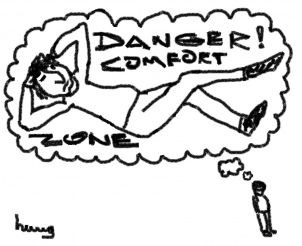Comfort Zone - Part 1
I will start my blog with a problem that I won’t resolve, at least, not in this blog. I have chosen to sit back in my comfort zone and to write down whatever comes to my mind, even if it doesn’t make any sense. If I don’t want to tackle the problem now, let it be. It will be allright, one way ore another.
Here’s my problem. Is it good or bad to be in your comfort zone? As long as I live, I am told that, if you want to get somewhere in life, you will have to step out of your comfort zone. That you will have to be bold. That you will have to go for something completely. To take things into your hands. To promote yourself. To fulfill your ambitions. To make the most of it. And so on, and so on.
On the other hand, I am overwhelmed by the image that you have to enjoy life. To seize the day. To be in the moment. To leave everything. You know those advertisements of cars. That man who’s stepping carefree into the car of his dreams, throwing his keys into the air and letting them spin like drum sticks, in the meantime flirting with a supermodel and putting the pedal to the metal. That man is in his comfort zone, isn’t it? Or am I wrong? He doesn’t look like somebody who’s ever going beyond his own safe environment. He has his meals ready for him daily, his car and his mobile phone. What more do you want?
And yet, this image is much more sophisticated than it seems. For instance, about putting the pedal to the metal. It contains an underlying message: Make the most of it. So, in a subtle way, the layer of unlimited possibilities and ‘The sky is the limit’ is connected to another layer that says that you have to be courageous, to make your dreams come true and to step out of your comfort zone.
Putting the pedal to the metal also means: Do what you want to do. Even if it is a little weird (a little, not too much). Even if it is a bit naughty. When writing this, I discover that I have made a link between today’s car advertisements and the poem ‘I am being pretty naughty’ 1 from 1955 by Annie M.G. Schmidt. Stunning, don’t you think, because who ever would think that we are still thinking in the same way as 60 years ago? Let’s face it, who is not thinking that the world has changed dramatically the past few decades? That we have made such a progress?
Nothing could be further from the truth. In terms of technology we have made progress, that’s obvious. But in terms of standards and values, it frightens me sometimes. Are we really that progressive? I don’t think so. To make that clear I have questioned some fundamental values.
Freedom?
In our world, monitoring is stronger than ever. Everything is being recorded, every action asks for your personal data. Only if you have done that, you will obtain freedom. If you haven’t, you are nothing, a prisoner, somebody with a special status, somebody without an account, a computer illiterate, a guest, an outcast, a refugee, a lost cause.
Tolerance, autonomy and empowerment?
When at primary school, I hardly understood the meaning of these words. But they were our culture, they were important, so you had to know about them, even if you were only a child. At that time, they were Holland's pride, and they still are. However, you can explain them in the best possible way, but if they don’t make any sense to the listener, you better say nothing at all. As a 12-year-old boy I hardly understood the definitions of tolerance, autonomy and empowerment. Furthermore, the concepts gradually disappeared from Dutch culture, which in turn was changing into a no-nonsense culture. More and more individualistic. More and more every man for himself. The concepts became a caricature of themselves. Tolerance has yet passed from the scene. Autonomy has become opportunism. And we actually never had something like ‘empowerment’. Indeed we want to get involved in everything. That’s why meetings are being created. In there, we sit still and wait, apathetic. Because ‘they will do what they want anyway’. Dialogue or just a joke?
The meaning of tolerance, autonomy and empowerment only became clear to me when I was in my twenties. At that point, in the beginning of the nineties, they already were becoming blurred. And Holland would become even more self-defeating...
(To be continued)
Huug VerschuijlNotes
1 Annie M.G. Schmidt (1955). Ik ben lekker stout.
https://bloemlezingilonka.wordpress.com/het-eigenzinnige-kind/ik-ben-lekker-stout/
My next blog
My next blog will be published on May 19, 2016 at 10:15 a.m.
If you like, join me on my Facebook Page: https://www.facebook.com/huugsblog/



![Photograph by Didouner (http://www.fauteuil-club.info) [GFDL (http://www.gnu.org/copyleft/fdl.html) or CC BY-SA 3.0 (http://creativecommons.org/licenses/by-sa/3.0)], via Wikimedia Commons Photograph by Didouner (http://www.fauteuil-club.info) [GFDL (http://www.gnu.org/copyleft/fdl.html) or CC BY-SA 3.0 (http://creativecommons.org/licenses/by-sa/3.0)], via Wikimedia Commons](https://huugsblog.nl/media/zoo/images/Knipsel_leunstoel_fffe0517f6db41b480b7489d26862f6d.JPG)
